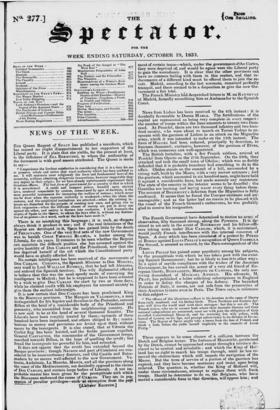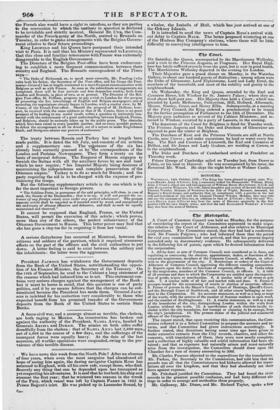There appears to be some chance of a collision between
the Dutch and Belgian troops. The fortress of Maestricbt, garrisoned by the Dutch, cannot be approached except through a territory de- clared to be neutral and inviolable ; and which the King of Ho!- land has no right to march his troops through, until he has re- moved the obstruetions which still impede the navigation of the Meese. But the term of service of. a portion of the garrison has expired, and they have become mutinous. and insist upon being relieved. The question: is, whether the King of Holland will, 'under these circumstances, attempt to replace them with fresh troops. Should he determine to do so, the Belgians, who have moved a considerable force in that direction, will oppose him; and the French also would have a right to interfere, as they are parties to the convention by which the territory in question is declared to be inviolable and strictly neutral. General ST. CYR, the Com- mander of the Frenclyarmy of the North, arrived in Brussels on Tuesday, in order to tnake arrangements with the Belgian Govern- ment relative to their future proceedings.
King LEOPOLD and his Queen have postponed their intended visit to Paris. It is said that his Ministry represented toLropoLn, that this close and familiar intercourse with France was extremely disagreeable to the English Government.
The Directors of the Belgian Post-office have been endeavour- ing to establish a more frequent communication between their country and England. The Brussels correspondent of the Times says- " The Duke of Richmond, or, to speak more correctly, Mr. Reeling (who rules both his father, the Secretary of the Post. office, and his Grace the Post- master-General) has at length consented to a morefrequent communication with Belgium as well as with France. As soon as the subordinate arrangements are completed, there will be four arrivals and four despatches weekly, both from London and Brussels, in place of two, as at present. The Director of the Bel- gian Post-office, M. Deliosse, proposes to pay anrisit to London for the purpose of promoting the free interchange of English and Belgian newspapers, and of seconding the negotiations already begun in London, with a similar view, by M. Comte, of the French Post-office. -Should the proposal of M. Delfosse, how- ever, be received with the same coldness as that of M. Comte, there is no great prospect of its leading to any useful result, unless a question so intimately con- nected with the maintenance of a good understanding between England, France, and Belgium, should be seriously taken up by the public press. The obstacles which have been raised in every possible quarter, and on every possible pretext, to defeat the arrangement in all its details, are of a nature to make Englishmen blush, and foreigners admire our powers of endurance."





















